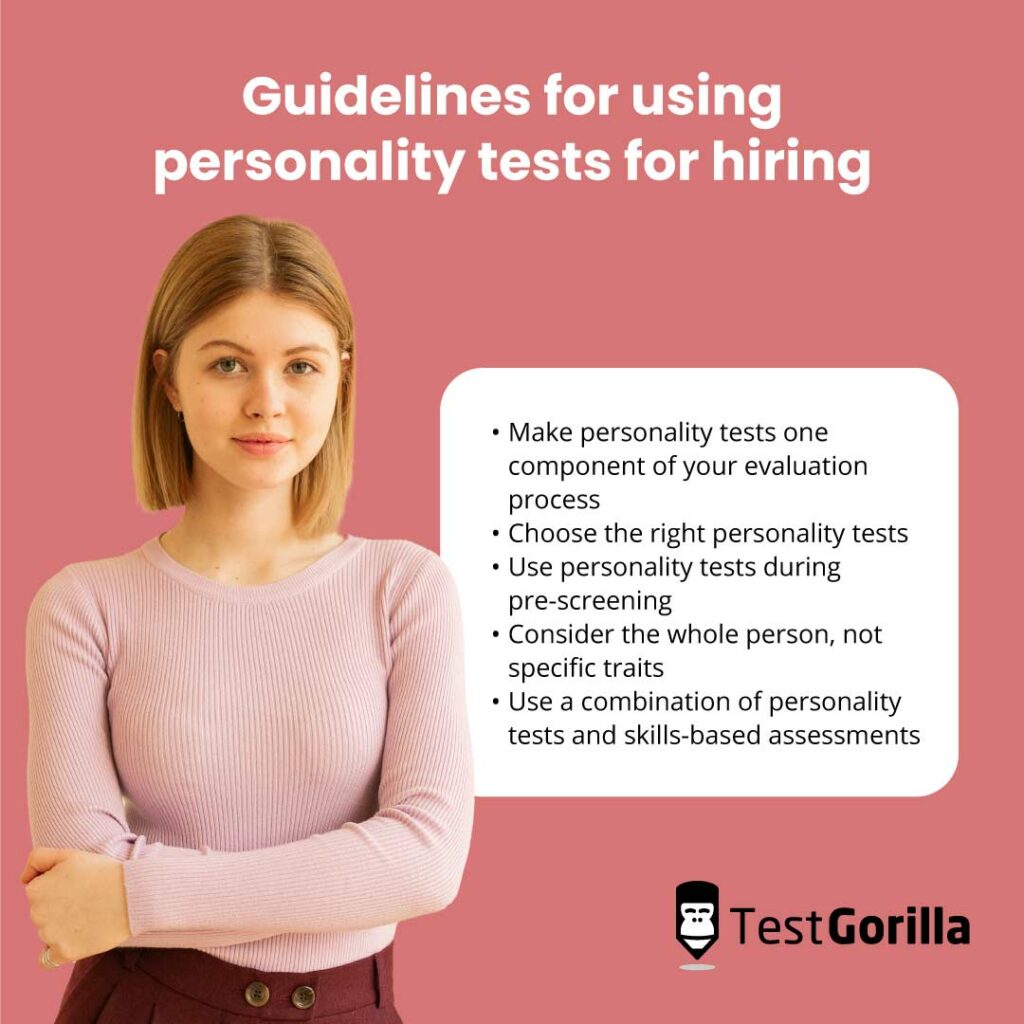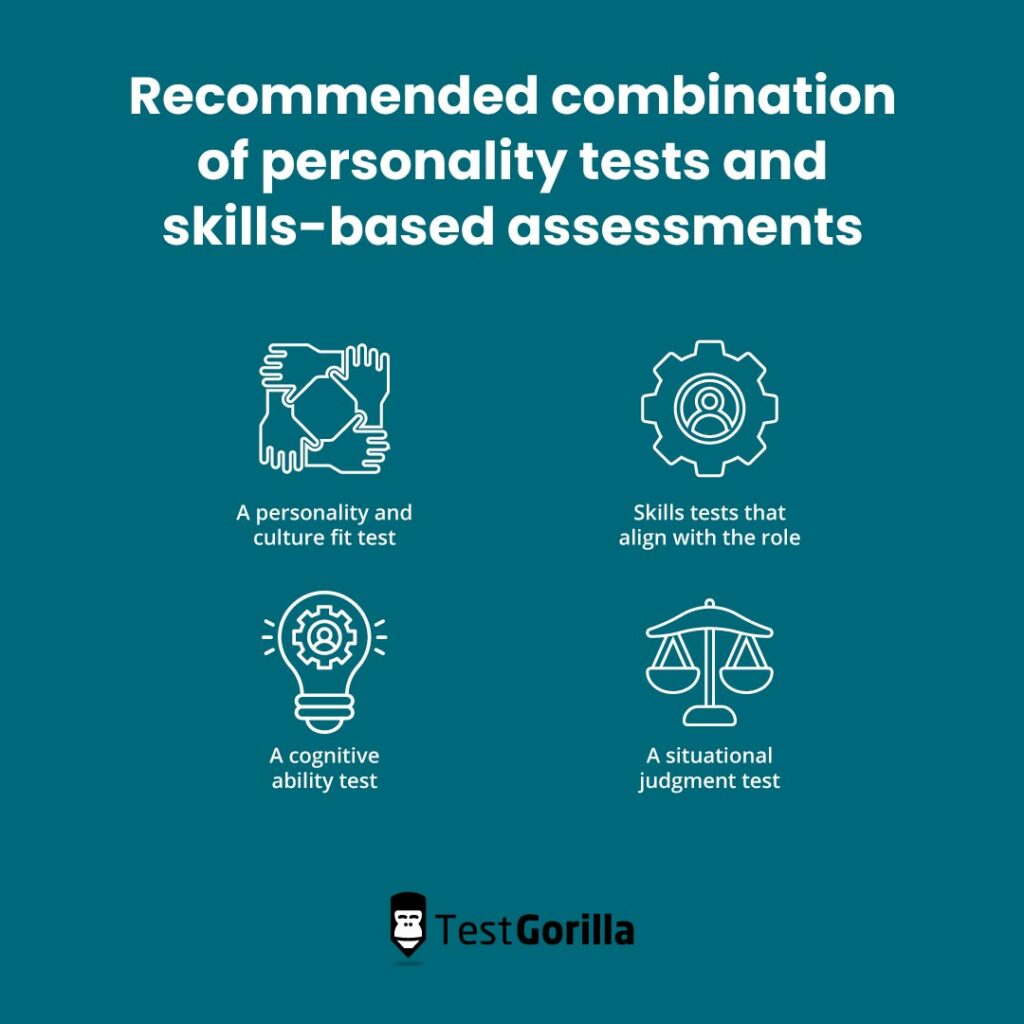Personality tests have become a staple in the hiring process, but guidelines and best practices for conducting them are lacking. Using them recklessly or relying on them too heavily can have serious consequences.
We’ve personally hired over 100 people using pre-employment tests, including personality tests, so we’re confident they work. Based on our experience, it’s almost always the execution that causes problems, not the tests themselves.
Simply put, if you’re getting undesirable results from personality testing, you need to change the way you use them.
We don’t dispute that personality tests have their limitations, including the risk of introducing bias or overlooking qualified candidates. But the biggest reason people think they’re a waste of time is that they’re focusing on the wrong things.
Table of contents
Make personality tests one component of your evaluation process
Understanding an applicant’s values and beliefs can help you predict how they might approach work-related issues. However, if you’re only looking at the raw scores on a personality test and using the results to screen out candidates, you’re missing the mark. You’ll only have a superficial picture of potential hires and have no clue if you missed out on the perfect candidate.
To illustrate, let’s say you’re hiring for a customer success role, and you identify two candidates who both score highly on an Enneagram test. One has a strong background working in a customer success role, while the other does not. By focusing only on test scores, you could end up hiring the candidate with less real-world experience instead of the more qualified person.
Don’t use personality tests to make an all-or-nothing decision about a candidate. Instead, use them in your evaluation process as one piece of the puzzle. You’ll make better hiring decisions when you assess candidates’ soft skills and expertise.
Choose the right personality tests
Personality tests aren’t all the same. Haphazardly downloading a test from the internet is risky because you have no idea whether it will be accurate. Using unreliable tests could give you a false impression of your candidates’ personalities, a surefire way to make hiring mistakes.
Avoid tests that aren’t widely used or don’t fit the role you’re hiring for. Instead, use personality tests that are well-established and based on research and theories of reputable psychologists. We recommend:
These are all reliable tests that can provide valuable information on a candidate’s communication skills and analytical ability and how they may fit into their potential role.
It’s also important to compare personality tests to find the one that best suits your needs. Dive into the Enneagram vs. 16 Personalities tests guide, for example, to learn which test is better for assessing your applicant pool.
Use personality tests during pre-screening
If you’re handing out personality tests after the interview process has started, you’ve missed the boat. When you interview a candidate before they submit their test, you may form unconscious biases based on that initial interaction. “Even during the briefest interactions, a person’s speech patterns shape the way people perceive them, including assessing their competence and fitness for a job,” explains Michael Kraus, assistant professor of organizational behavior at the Yale School of Management.
To prevent bias from influencing your interactions with candidates, we recommend conducting skills-based and personality tests before the interview process starts. By testing first, you get an objective sense of applicants’ personalities and how they might fit in with your team while minimizing the possibility of biases creeping into an interview. Plus, it makes your prep work easier by giving you ideas for relevant interview questions.
Consider the whole person, not specific traits
You might think you need to hire people with certain traits, but precise characteristics don’t always translate into real-world success. While it may be tempting to use personality tests to screen for specific qualities, like leadership or teamwork, remember that character is dynamic and can change over time or in different situations. Research suggests that even ordinary things like chronic stress at work can change people’s personality traits.
It’s also possible you’re not clear on the qualities an employee needs, and you’re introducing bias by making hiring decisions based on specific character traits. For example, introverts can be great leaders, and extroverts aren’t always naturally suited to lead.
Don’t discount someone just because their personality doesn’t fit the mold you had in mind. They could bring valuable skills and perspectives to your team you hadn’t considered.
Why we recommend a combination of personality tests and skills-based assessments
While we’re bullish on personality testing, we’re adamantly opposed to relying solely on them for hiring decisions. Using a combination of skills-based and personality assessments is the only way to evaluate a candidate effectively.
When done right, personality tests can provide insight into someone’s ability to collaborate and respond to a variety of scenarios. Skills-based assessments can identify people with the right background and competencies for the job.
By switching up how you evaluate candidates, skills-based hiring also promotes diversity in the workplace. Wouter Durville, our co-founder, explains: “When you give diverse candidates more of a chance – by hiring for proven skills rather than looking at resumes and inadvertently being drawn to people who are similar to you – you make diversity possible.”
Using both kinds of evaluations gives you a complete picture of whether a candidate is a good fit, resulting in a higher percentage of successful hires. It’s also better for employees – our State of Skills-Based Hiring 2022 report found that over 72% of employees who were hired using skills-based hiring were happy or very happy with their jobs.
At TestGorilla, we (unsurprisingly) use our hiring assessment tools to speed up the recruiting process and ensure we’re avoiding bias. We start testing from the get-go – before we even ask for a resume, we link candidates to an assessment in our job descriptions. These tests evaluate the essential soft and hard skills needed to succeed in that specific position. We do personality testing up front so we can get to know candidates’ general personalities before meeting them. We don’t use it to pass/fail people or weed out specific characteristics.
Our best advice is to put together multi-measure assessments by blending different tests. In our experience, this is the most accurate way to determine if a candidate will flourish in their role. For example, if you’re hiring an email marketer, evaluate their soft skills and expertise in creating HTML templates.
Tests shouldn’t be limited to one skill. We recommend the following combination to make sure you cover a variety of hard and soft skills:
A personality and culture fit test
Skills tests that align with the role
A cognitive ability test
A situational judgment test
Once we have our top scorers from the assessment stage, we ask those candidates to provide relevant samples of their work. It’s an excellent way to see their skills in action and better understand how they’ll perform on the job. Plus, it aligns with our focus on skills-based hiring, which means we’re looking at what candidates can actually do rather than just their answers to test questions.
Related posts
Hire the best candidates with TestGorilla
Create pre-employment assessments in minutes to screen candidates, save time, and hire the best talent.
Latest posts
The best advice in pre-employment testing, in your inbox.
No spam. Unsubscribe at any time.

Hire the best. No bias. No stress.
Our screening tests identify the best candidates and make your hiring decisions faster, easier, and bias-free.
Free resources
This checklist covers key features you should look for when choosing a skills testing platform
This resource will help you develop an onboarding checklist for new hires.
How to assess your candidates' attention to detail.
Learn how to get human resources certified through HRCI or SHRM.
Learn how you can improve the level of talent at your company.
Learn how CapitalT reduced hiring bias with online skills assessments.
Learn how to make the resume process more efficient and more effective.
Improve your hiring strategy with these 7 critical recruitment metrics.
Learn how Sukhi decreased time spent reviewing resumes by 83%!
Hire more efficiently with these hacks that 99% of recruiters aren't using.
Make a business case for diversity and inclusion initiatives with this data.





















